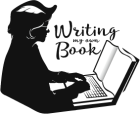While my primary work is coaching writers through their writing process, I’d like to use my experience as a job search coach to benefit you as a writer. Authors are often like job seekers. Interview strategies that lead to collaboration may be the best step you could take to reach your goals. Think James Paterson. He always gives his co-authors credit for the significant role they play in writing his novels. A new model has emerged—one where the person with the ideas, the characters, plot and story arch can partner with a writer with the skills to bring everything to life. It’s even better when two powerful writers work together!
Or your book might be one of those that needs the contribution of others to bring it to life. When this happens, interviews become an important aspect of the job. In either case, your  strategies will be similar.
Let’s set the scene.
You’ve made it to the interview! Your writing has gained entrance. However, you must never forget there are other talented writers, and few people limit their research to one person. This is why you don’t want to leave your best your best opportunity to sell yourself as the right candidate for a writing job or collaboration without closing the interview like a sales call. It’s one of your most important interview strategies. If you don’t close that sale, you’ve cut your chances that you’re the person they will hire.
Don’t worry. I’m not asking you to turn into everyone’s pushy car sales nemesis. I’m suggesting you learn those techniques consultative sales specialists use to build long-term customer relationships.
How to Close an Interview
Just as a sales person tries to close the sale before he or she walks out the door, you need to close your interview before you leave the room (or call). Let’s look first at the elements of a close.
- Find out whether your ‘prospect’ is interested.
- Gather more information.
- Overcome obstacles blocking your ‘prospect’s’ interest.
- Generate increased interest.
Questions to Uncover Interest
Most interviews draw to a close with the following question: “Do you have any questions for me?” This is your perfect opening for asking questions that help you find out whether they are interested in hiring you. You don’t want to ask, “Am I in the running? Are you interested in hiring me?” It’s okay to be direct, yet being this blunt could repel your potential employer.
Instead, ask questions that show you are open to evaluation.
- Am I someone you can see excelling at this job beyond your wildest expectations?
- Can you picture me adding significant value to your marketing team?
If the answer is no, then follow up with questions and responses which address the concerns voiced by your interviewer(s).
- Are there any obstacles you see to moving me forward in the hiring process?
If the answer is yes, find out what those obstacles are. You may have experience which overcomes those barriers.
Questions to Uncover Expectations
If you don’t feel comfortable with asking such direct questions, your questions can be more subtle. Ask questions that show your interest in meeting expectations.
- What is your typical training process?
- How would you expect me to fit into your existing marketing team? What aspects of the job would it be most important for me to focus on?
- What is the next step I should prepare for in this process?
All of these questions move your potential employer toward seeing you in the job.
Questions to Gain Additional Insights
Another way to show your ability to grow into a job successfully is to ask questions which seek advice.
- If you hire me for this job, what is the most important piece of advice you have for my success?
- Is there something I could do to increase your confidence that moving me forward as a candidate is a good decision?
Remember that as you gain additional insights into the company’s needs, you are also capturing another opportunity to show your fit for the job.
Summary
Of all the interview strategies you can use, learning to close the sale of yourself as the candidate to hire (or move up the hiring chain) is one of the most important. Begin with questions that evaluate where you are as a candidate. Then use ask questions which gather more information so you can generate deeper interest and overcome obstacles to hiring you for the job.

